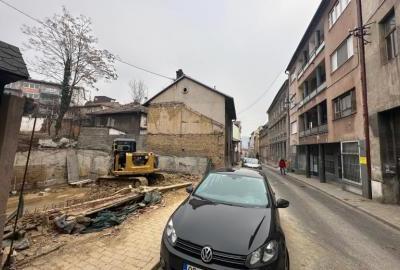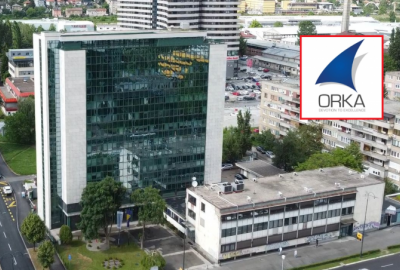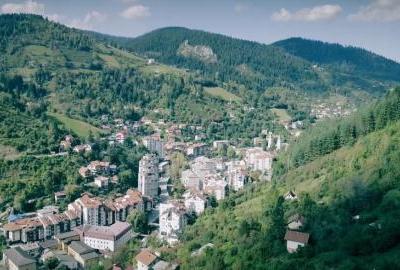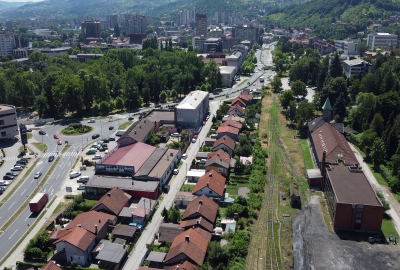Žurnal in English
INDEPENDENCE OF KOSOVO’S ELECTRICITY SYSTEM: Unfinished business caused unrest in the north of the country
The independence of the Kosovo Transmission System and Electricity Market Operator from the Electricity Network of Serbia was agreed in negotiations led by the then European Commissioner Catherine Ashton. It was also one of the points of the Brussels Agreement signed by the Prime Ministers Ivica Dačić and Hashim Thaçi in 2013. At that moment the issue of electricity supply became technical, but it also quickly shifted to the field of politics

“Kosovo is energy independent and controls the supply on its entire territory,” announced the authorities in Prishtina in mid-December last year, presenting it as a political victory and a big step towards full recognition of the statehood. That information was “buried” as much as possible in the Serbian public, and both sides erected a “wall of silence”, so both journalists and the businesses in the electricity market were denied answers to specific questions. Not without a reason. Namely, all the dilemmas from the separation process are far from being resolved, and the negotiations that seem to be under the radar of the public are not going smoothly.
The independence of the Kosovo Transmission System and Electricity Market Operator (KOSTT) from the Electricity Network of Serbia (EMS) was agreed in negotiations led by the then European Commissioner Catherine Ashton. It was also one of the points of the Brussels Agreement signed by the Prime Ministers Ivica Dačić and Hashim Thaçi in 2013. At that moment the issue of electricity supply became technical, but it also quickly shifted to the field of politics. So the President of Serbia, Aleksandar Vučić, assessed the failed attempt of KOSTT to enter the European Network of Transmission System Operators (ENTSO) in 2018, which was also part of the Brussels package, as a great success, even more significant than preventing Kosovo from becoming a member of Interpol. However, KOSTT became a member of ENTSO in April last year, and at the same time an agreement was signed giving it independence and consent to replace its affiliation to the energy bloc of Serbia, which still includes North Macedonia and Montenegro, by joining Albania.
The Agreement entered into force on May 15 last year, and the last “pocket” of four municipalities in the north with predominantly Serb population, which were supplied by the Electric Power Industry of Serbia (ESP), through Valač substation, was transferred to the Kosovo operator on December 14.
According to the Brussels Agreement, the Kosovo authorities should issue a license for the work of the subsidiary of the EPS, no later than 30 days after the independence of the electricity network. The subsidiary would be in charge of supplying mainly the north of Kosovo. The problem arose because the Kosovo authorities are ready to give a license only for the supply, while the Serbian side believes that it has the right to two companies, one of which would deal with supply and the other with distribution and collection. The license is still not arriving, and the citizens from the north of Kosovo are most worried, since they do not know who will provide them with the electricity and charge them for it. According to the editor of the Kossev portal, Tatjana Lazarević, they are neither receiving information from Prishtina nor Belgrade, and the only thing that journalists can “extract” is the data from the official documents.
- Under the Brussels Energy Agreement, both sides agreed to establish such a company in accordance with Kosovo’s legal and regulatory framework. It is also stated that the new company will supply electricity and be able to provide distribution services (such as billing, collection, maintenance and physical integration of new customers to the network) in four Serb-majority municipalities in the north and will be able to buy and sell energy on the open market. Serbia, which has been resisting the plan to implement the Energy Agreement so far due to the claims at the Valač and Gazivoda substations, has got yet another problem: the refusal to establish its own distribution. Serbian government officials have repeatedly said that they are waiting for the establishment of the Association of Serb- majority municipalities with a Serb majority, which is also part of the agreement from Brussels - says Lazarević.
She explains that according to the Agreement, KOSTT is putting Valač substation, in the north part of the country, which was part of EMS, under its control.
- On the ground, electricity is no longer coming from Serbia, that channel is closed. Electricity is there, but interruptions are more frequent than before. Why, we don't know. We tried to find out more from the director of the office for Kosovo and Metohija, but he also avoided a specific answer, only claiming that the citizens would not be left without power supply. The bills are not being delivered yet, but they are expected very soon - says Lazarević.

(Tanja Lazarevic, journalist, Kossev, 01/04/2019 Kosovska Mitrovica, Photo Marija Jankovic)
Nikola Nedić from the company Energia Gas & Power, which operates on the open electricity market, says that the independence of the Kosovo’s network has not changed much in the region, except that now all needs, surpluses and deficits must be regulated by Albania, and it was done by the Electricity Network of Serbia (EMS) before. He believes that EPS, in an economic sense, should not have any consequences due to the separation of the energy system of Kosovo, but he also confirms that it is difficult to get information.
- Kosovo does not have enough energy from its production, it is mostly obtained from the thermal power plants Obilić near Priština, which are very old and inefficient, have frequent outages and are not operating. At the same time, the coal is of very poor quality, so they operate with difficulty. Generally, it is turned to import of electricity, procuring it through tenders, through negotiations, from all active traders in the region or at auctions. It is an open market where the only criterion is the price and possibly payment methods. However, the one thing hindering the functioning is that the electricity border between Kosovo and Serbia has not been established yet - says Nedić and adds that they exist with Montenegro, North Macedonia and Albania, and all companies from the region trading electricity are on them.

(Nikola Nedić)
An important part of Kosovo’s energy system that the Brussels agreement did not solve is the management of Lake Gazivoda. It is an artificial reservoir, which is the most important water resource in Kosovo, making up 69% of the total reservoirs and is the main water source for cities such as Kosovska Mitrovica and Gračanica, but also Prishtina and Vučitrna. In addition, the water from the lake simultaneously cools the turbines of the Obilić thermal power plant, which would not work without it. Also, there is a hydroelectric power plant on the Kosovo side. However, the watercourses that fill the reservoir are on the Serbian side, and if the course of Ibar River were to be diverted, the lake would dry up and Kosovo would have its own electricity only to supply key institutions, such as hospitals. The lake’s resources are now managed by two companies, one under the jurisdiction of Pristina, the other of Belgrade, and they do not recognize each other.
Gazivode was on the negotiating table for the first time only on September 4 last year, when the Trump administration organized talks on cooperation between Serbia and Kosovo. One of the points of the Washington agreement is the possibility of joint management of that resource, which was to be examined and formulated by experts from the United States Department of Energy. How the new administration will look at the entire agreement is not known yet, but there are assumptions on how the problem is to be solved.
Namely, domestic analysts believe that in the short term Gazivoda will be internationally managed, followed by privatization of parts of the energy sector in Kosovo. Speculations mention a plan to ensure the joint use of Gazivoda through the management by foreign companies, most likely private ones from the West, to which UNMIK would entrust the mandate to manage the reservoir in the interest of the Serbian and Albanian side. This would ensure that neither side is damaged, or that both have equal access to those resources.
This is supported by the fact that there is a great interest of foreign companies in acquisitions in the energy sector of Kosovo, so privatization of the two companies after the start of joint management process should not come as a surprise. This would enable their smooth functioning, which is important for the life of both subjects. Interest in the privatization of the energy and mining sectors in Kosovo is shown by companies from the West, but also from China. However, if viewed geopolitically, bearing in mind the fact that NATO troops are present in Kosovo, it is logical to assume that a Western company could become the owner of both hydroelectric power plants and water supply facilities in Gazivoda.
Although Serbian officials believe that the point of the Washington agreement referring to the right to use the artificial lake Gazivoda is a benefit for Serbia, its formulation actually does not reveal a realistic foundation for such a belief. At one time, the pro-government media interpreted this point as to predict that Serbia would get the right to the hydro potentials of Gazivoda, as well as to a part of the profit generated by the water supply company under the control of Prishtina. However, the content of the agreement does not explicitly state that, it only says that “both sides will agree to cooperate with the United States Department of Energy and other relevant legal entities of the United States Government in the feasibility study for sharing Lake Gazivoda as a reliable water and energy supply.” So, nowhere does it say that Serbia will have the right to a part of the profit generated by the Water Management Company “Ibar – Lepenac” under the jurisdiction of Prishtina. When it comes to “reliable water and energy supply” it has not been clearly stated what that concretely should mean. Some Serb-majority municipalities in the north of Kosovo are already supplied with drinking water from Gazivoda, and all receive electricity from the hydroelectric power plant of the same name.
Milica Andrić Rakić, correspondent of Deutsche Welle from Zubin Potok in the north of Kosovo, says that she believes in the possibility of reaching a solution that would enable the resources of Lake Gazivoda to be shared.
- I am convinced that we are moving in the direction of an agreement that will enable the joint use of Lake Gazivoda, which would provide unhindered financing of the Public Company “Ibar” that manages the hydroelectric power plant “Gazivode” and maintains the dam. The only revenues that the company generates are the one provided by Belgrade, but at the same time it does not have the possibility to collect the profit from the maintenance of the system that serves to supply water to, inter alia, Prishtina - our interlocutor explains.

(Milica Andrić Rakić)
Lake in numbers
The artificial lake Gazivoda was created in 1977, when the Belgrade company Hidrotehnika - Hidroenergetika built one of the largest dams in Europe with a clay base in the area of Gazivoda village, according to a project made by Energoprojekt. The hydroelectric power plant “Gazivoda” with the capacity of 38 megawatts was also built. The main purpose of the lake is to irrigate the Kosovo lowlands. The water from Gazivoda is drained through channels to Gračanica Lake and is used to supply Prishtina. Gazivoda was built with a loan from the American International Bank for Reconstruction and Development worth 45 million dollars. Serbia continued to repay the loan after the disintegration of the SFRY. The entire area of the lake is 20 percent in central Serbia, and 80 percent on the territory of Zubin Potok in Kosovo.
Trepča on tactical standby
Although the company Trepča does not belong to the energy potential of Kosovo, it is noticeably in a similar situation as Gazivoda. Once the largest lead and zinc mine in Europe, which employed up to 20.000 workers, was split in two parts by UNMIK 2000 - North and South. Both parts registered with Kosovo institutions to which they pay taxes and contributions. More than 3.000 people are employed in Trepča North under Serbian control, and it includes Crnac and Belo brdo mines, Koporiš surface mine, flotation, lead smelter and refinery Zvečan. Also, there are mines located in Serbia, in the municipality of Brus and Novi Pazar, Belo Brdo mine has even two entrances, one in Kosovo, the other in Serbia, while Crnac is entered only from Serbia, from the territory of Novi Pazar municipality. Trepča South, under management of Prishtina, draws ore from the Novo brdo and Stari trg mines, and is engaged in the extraction and processing of mainly lead and zinc. It has about 1.400 workers. Both companies have production that is far below pre-war production and survive thanks to grants from Belgrade for the North and from Prishtina for the South.
It is clear that the divided companies are not designed to function as separate systems, and in order to be able to operate normally, huge investments are needed, in the amount proportional to the loss generated by the separation of the other part. The only economically viable solution is unification according to the model that was assumed for Gazivoda - international management, then privatization. There were proposals to organize Trepča as a single system on the principle of holding, which would ensure more successful business, but the Serbian part does not agree to the administration that would be appointed by Prishtina because they are afraid for Serbian workers’ jobs. Such a move is hindered by the fact that Serbia had significant investments in the North, which is also acknowledged by the Albanian side. That is why Milica Andrić Rakić, the correspondent of Deutsche Welle from Zubin Potok from the north of Kosovo, does not believe that at this moment there could be a centralized management of Trepča, i.e. that the North would come under the jurisdiction of Prishtina.
- At the moment the issue of Trepča is not in the focus as Gazivoda. I do not believe in the possibility for Prishtina to take over management, the management of Trepča North does not accept such a possibility and the state of Serbia is calling for ownership of the mine. Furthermore, in case the Serbian part of the company comes under the jurisdiction of Prishtina, there is a fear of the possibility of privatization, which would endanger the existence of employees in Trepča North - she says.
Economic analyst Branko Pavlović believes that the issue of the Trepča mining basin will be a mean of pressure on Belgrade by Western countries in the coming period.
- Although Serbia is calling for ownership, the factual situation is such that Prishtina is able to take over the company by force. It is believed that a signal will most likely come to Serbia from the West at some point: If you want Belgrade to retain control over Trepča North, you will have to recognize Kosovo’s independence. That is the reason why the issue of Trepča is not being resolved at this moment together with Gazivoda - Pavlović states.

(zurnal.info)








